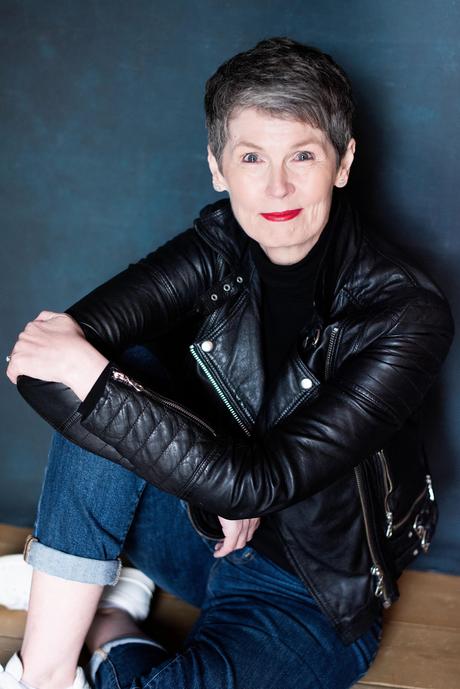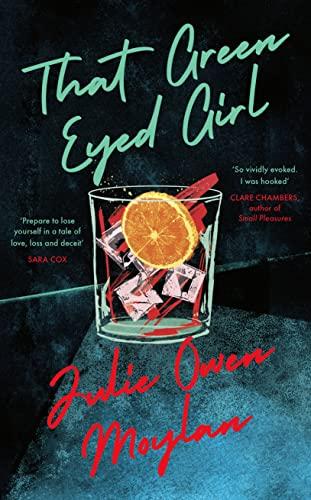 A big thank you for the enthusiastic response to the first part of my Summer Reads selection last week. I’ve been doing this for over ten years and it’s fantastic to see people adding books I’ve raved about to their TBRs, especially ones they’d never heard of. That’s unlikely to be the case with the book I’m featuring today; Julie Owen Moylan’s debut novel That Green-Eyed Girl is getting exposure far and wide which makes me all the more delighted to welcome her as the first Summer Reads author to join me on the Sofa. When Julie suggested writing about women and shame I knew we were in for something powerful and I wasn’t wrong. My review follows at the end:
A big thank you for the enthusiastic response to the first part of my Summer Reads selection last week. I’ve been doing this for over ten years and it’s fantastic to see people adding books I’ve raved about to their TBRs, especially ones they’d never heard of. That’s unlikely to be the case with the book I’m featuring today; Julie Owen Moylan’s debut novel That Green-Eyed Girl is getting exposure far and wide which makes me all the more delighted to welcome her as the first Summer Reads author to join me on the Sofa. When Julie suggested writing about women and shame I knew we were in for something powerful and I wasn’t wrong. My review follows at the end:
It was August, during a long hot summer of 1975, when my mother was finally sectioned and sent to a psychiatric hospital where she underwent a series of electric shock treatments. The hospital was an old Victorian building filled with strange smells and the wrong kind of noises. Patients were locked away or administered drugs so strong they sat in silent compliance. Visiting was brief and fraught with anxiety. We were children and my mother veered from furious rage that she was locked away, to desperate pleadings to be allowed to come home. The adults spoke of her needing to pull herself together, as if mental health was something you could control by force of effort.
As we walked away from the dismal visitors’ lounge with its stained armchairs and little tea trolley, there was another overwhelming emotion that none of us was permitted to speak of – shame. For what seemed like very good reasons to the adults around us (presumably to do with protecting us from being taken into the care system or bullied) we were not allowed to talk about our visits to the psychiatric ward. It was a code of silence that we abided by and the impact of that silence was both a sense of isolation from any kind of support, and a deep sense of shame that this had happened to our family.
When I began to write That Green Eyed Girl, I wanted to explore the emotional landscape of how women are shamed in a variety of ways. Taking part of the experiences of my teenage years but giving them to young Ava, in a shabby little apartment in New York City allowed me to explore a different scenario. I have always had a deep fascination with cities and the many layers of time that exist within it. Multiple lives lived out within the same set of walls, or on the same streets, and it was this that I thought about for a dual timeline story set twenty years apart.
Delving into my themes of women and shame, I began to read about the history of gay women in the US under McCarthyism. Finding that women could lose their jobs or even be locked up in psychiatric hospitals and given treatments to try and ‘cure’ their sexuality. To be uncovered as ‘queer’ was to risk being declared ‘unamerican.’ Your sexuality could be used as evidence that you were in fact, a traitor to your country. It was a terrible episode in American history and of course we can still see horrific examples of that abiding prejudice today.
A reviewer said to me recently that she thought one of the main themes of my book was loneliness, that all the characters crave a sense of connection, even when surrounded by other people. I think that’s true, but I would go further than that and say their loneliness is caused by a deep sense of isolation and that isolation is caused by shame. Shaming people takes away empathy about their situation. When we don’t allow people to show us who they truly are or what they are going through, we put people in the unenviable position of having to keep whatever they feel to themselves.
There is a moment in the book where my character Dovie talks about the difficulties of loving someone and not being allowed to show even casual affection in public. When you always have to watch what you say or how you behave, the end result is often the kind of isolation that diminishes any relationship. When we make it so hard for people to love, we often force them to love less. It becomes easier to conform, to sacrifice the part of themselves that is deemed unacceptable. When we ask people to hide themselves away, we make them less than human. That comes at great cost and I’ve tried to explore that cost in this book.
Thank you so much to Julie for this piece and its strong message about empathy and acceptance – Pride Month feels the idea moment to be hosting this. It moved me given the relevance of some parts to my personal experience (I mentioned my history with shame here)but more importantly, to that of so many people about sexuality, mental health or many other issues.
Author photo © Sian Trenberth

I came to this debut novel with the luxury of knowing nothing about it except possibly that it’s set in New York City. I may not recall that detail but given how clearly I remember the characters and emotional impact they had on me, it came as a shock to look back at my records and find that I read it eight months ago. This story took up residence in my head and kept calling me back (and it’s still there now). I looked forward to spending time with Gillian and Dovie as if they were people I cared about in my own life, and that is quite a rare feeling.
I hadn’t realised at the outset that this was a queer love story, a gorgeously romantic and tragic one which invites reflection on the distance that’s been covered towards acceptance and away from prejudice, and how far there still is to go. But this story is actually two, told as a skillful and synergistic dual narrative and Ava’s coming-of-age strand set in the 1970s is just as poignant, particularly as it relates to mental health. It only remains to praise the superbly vibrant and atmospheric portrayal of bygone NYC in both the 1950s and 1970s. A fantastic summer read that delivers style and substance, with echoes of The Seven Husbands of Evelyn Hugo by Taylor Jenkins Reid and Notes on a Scandal by Zoë Heller.
*POSTSCRIPT*
Having just had Covid again, I’m looking forward to a restorative fortnight in Andalucia not doing much except swimming, reading and maybe even writing. So many things have been pulling me away from my manuscript that a holiday might be my best hope of getting back to it. In early July I’ll be hosting a guest post by Lynn Bushell on being an artist fictionalising a real artist, something she’s done twice, most recently in her new novel The Lovers and the Dustman about the unconventional love life of Stanley Spencer.

